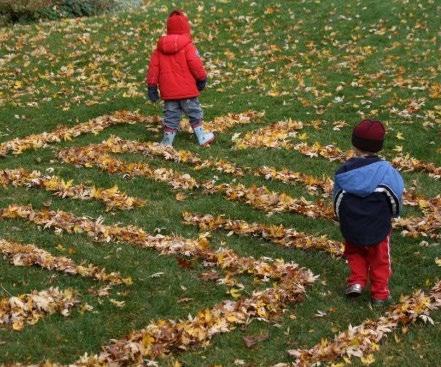
5 minute read
Education
What Do We Say to the School about our Separation?
By Rebecca Giraud & Bob Greig
Advertisement
Five “Must-Do’s” When Choosing a School for your Child
By Judith Judd
Any parent who has been through a separation will understand the massive stress it involves and the anxiety around co-parenting. One of the important issues that can get overlooked in the mix is what to tell your child’s school. READ MORE
It always makes sense to put your child at the centre of the process when choosing a school. Parents know better than anyone how different individual children can be and individual schools can be very different too.

READ MORE
Get your Child’s Education Back on Track
At First Class Learning, we want to help get your child’s education back on track after lockdown. Our maths and English programmes help children excel and overcome challenges. Our programmes are designed around the National Curriculum and following our unique skills assessment, are personalised for every child’s individual needs.
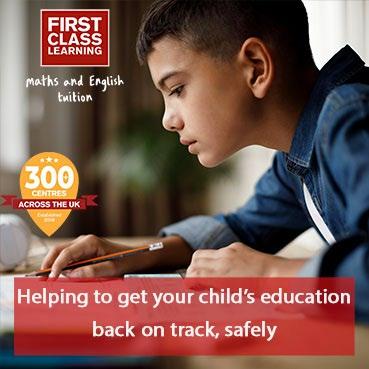
The majority of our centres are now open again, and have been adapted to be Covid-secure, with everything from social distancing to sanitised workspaces, ensuring your child is safe with us.
Speak to your local Centre Manager for more information or to book an assessment.
18 Top New Children’s Books for Autumn
Duck and Penguin Do Not Like Sleepovers Julia Woolf. Night time adventure for babies/toddlers.
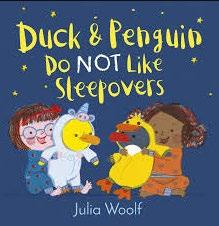
That Dog! Emma Lazell. Will smart dog outwit the dog-nappers? For babies/toddlers.
Things I Love by Bear Susie Linn/Alex Willmore. Scenes and activities little ones will recognise. For babies/toddlers.
The Diddle That Dummed Kes Gray/Fred Blunt. Laughter, music, word play & silliness. Ages 3+.
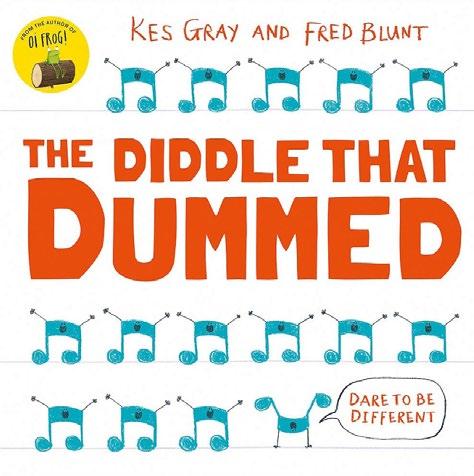
It’s OK to Cry Molly Potter/Sarah Jennings. Great intro to emotions. Ages 3+.
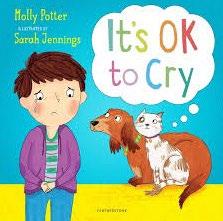
I’m Sticking with You Smriti Halls/Steve Small. A story about friendship. Ages 3+.
Moth By Isabel Thomas/Daniel Egneus. Powerful/ visually spectacular evolution story. Ages 5+.
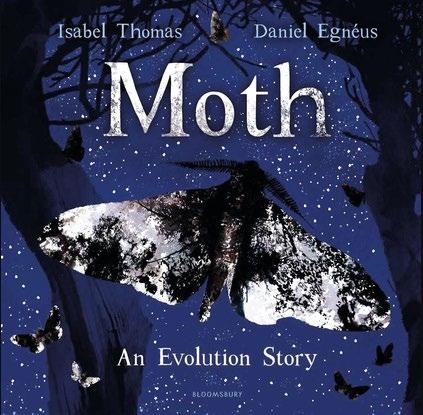
The Blue Giant By Katie Cottle. Poignant story about pollution in our oceans. Ages 5+.
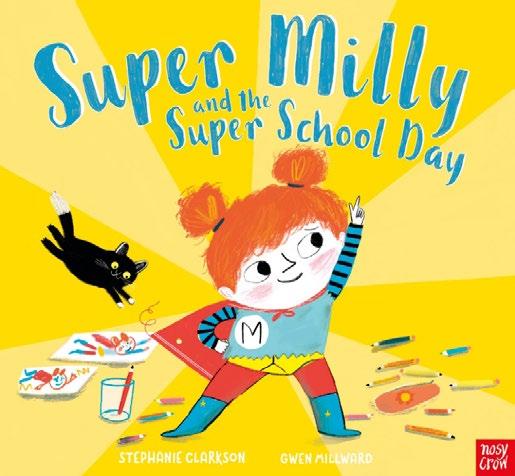
Super Milly and the Super School Day By Owen Millward. Upbeat/funny picture book about kindness. Ages 5+.
18 Top New Children’s Books for Autumn
Mermaid School: Ready, Steady, Swim!
Lucy Courtenay/Sheena Dempsey. An underwater school story. Ages 7+.
Noah Wild and the Floating Zoo
Alexander Mccall Smith. An ordinary boy’s heartwarming/extraordinary feat. Ages 7+.
Beneath the Cloud of Doom Louis Sachar/Aleksei Bitskoff. Brilliantly illustrated story of mixedup mayhem. Ages 7+.
My Name is River Emma Rea. Thrilling, ecological adventure in the Amazon jungle. Ages 9+.
Turtle Boy M. Evan Wolkenstein. A story offering hope/ new perspectives to life’s outsiders. Ages 9+.
Health Heroes Emily Sharratt. ‘Health heroes’ talk about their working lives. Ages 9+.
The Virus Ben Martynoga/Moose Allain. Explores the science behind viruses/Covid-19 pandemic. Ages 11+.
Return to Wonderland
Wonderland-inspired stories from top contemporary authors. Ages 11+.
The Unadoptables
Hana Tooke/Ayesha L.Rubio. Adventure set in oldworld Amsterdam/ surrounds. Ages 11+.
Supporting a Dyslexic Child
By Ellie Malt “Do you think she might have dyslexia or something like that?” I asked.

I was standing in the playground with one of the teaching assistants, watching my 4 year old climb into her buggy, eager for her after-school snack. Although it was only her second term in Reception, I’d noticed she seemed uninterested in the alphabet, while other children could already write their names. But I was only really thinking out loud. Even to me, it seemed ridiculously early to be jumping to any conclusions. “Probably” she shot back over the general hubbub. I admit, I was shocked. But looking back years later, finally in possession of a formal diagnosis, I appreciate her honesty. I only wish I had acted sooner; it could have saved so much struggle and frustration. READ MORE
Dyslexia Features
Your child may:
Talk well but write little; Be a slow/reluctant reader; Struggle with spelling; Have difficulties with writing; Not always remember/ understand what he/she has just read; Seem inattentive and unable to concentrate/remember instructions; Have difficulty organising himself/herself; Struggle to remember the order of things, eg days of the week.
Sources of Help
British Dyslexia Association Advice and assessments. Find your local association. The Dyslexia Association Screening, assessment, tuition, assistive technology training. Dyslexia Assist Find local support. Achieve Now Works with dyslexic pupils and IT. All services online. IPSEA Free, independent legal information, advice and support. Helen Arkell Dyslexia Centre Influential regional centre.
Top Homework Tips
Where, When and How
Create space. If possible, this should be a communal space but one with minimal distractions. This enables parental supervision/input without it feeling like an intrusion.
Establish a routine. Some children prefer to do homework straight after school; others need to ‘unwind’ or eat first. Whatever is decided, stick to it.
Get organised. Have your child do the hard work first when they are most alert. Help them make a “Done/To Do” list.
What YOU Can Offer
Discuss homework. Even if you know nothing about a subject, you can still help just by talking, listening and helping them to find the right answer. Use a timer. Challenge your child to estimate how long an assignment might take. Suggest setting a timer for that amount of time, or less. Encourage. Praise effort not achievement. Focus on hard work or improved concentration, handwriting or presentation. Make it positive. Tell them how important school is. Your attitude to homework will influence their attitude.
Let THEM Do the Work
Provide guidance, not answers. Use questioning to help them get as close to the answer as they can but don’t tell them. Let them make mistakes. Giving answers means they will not learn the material and their teacher will not know how much they understand it. Step in only when progress comes to a halt. Encourage them to set small positive targets promoting independent working and self
sufficiency.

Autumn Outdoors
Enjoy these seasonal outdoor activities with the family.
Bark Rubbing
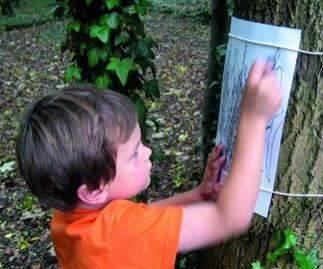
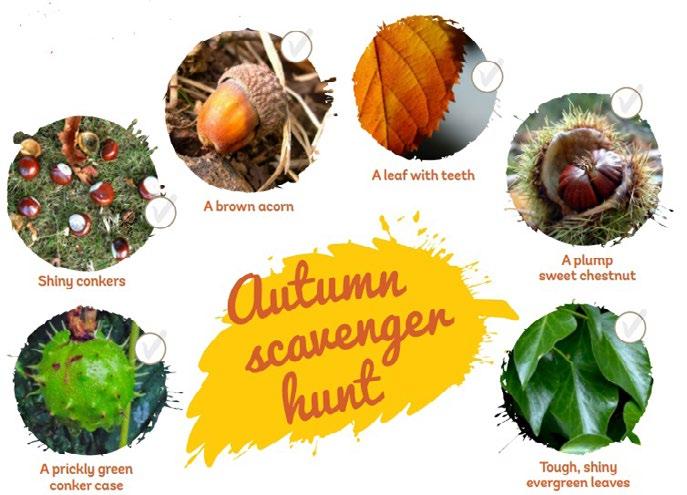
Autumn Scavenger Hunt

Conkers
Mushroom Hunting

Tree Decorating
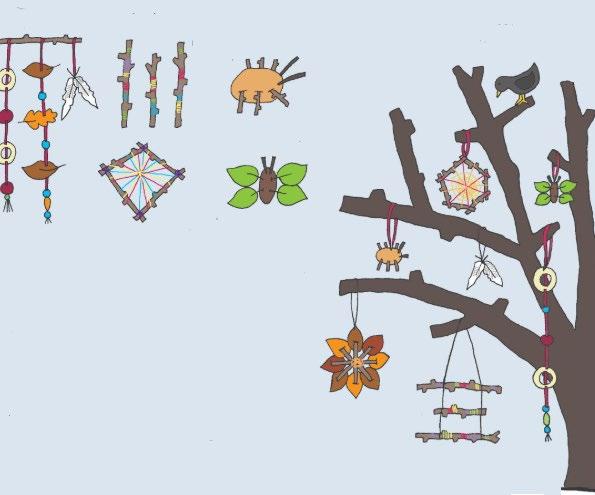

Making and Flying a Kite
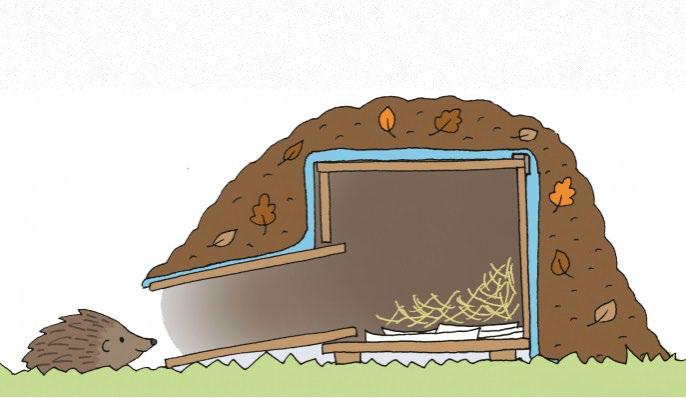
Building a Hedgehog Home
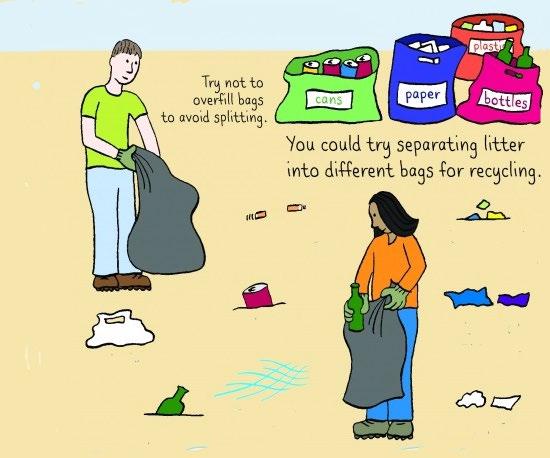
Litter Picking
